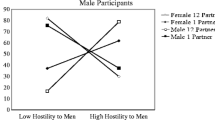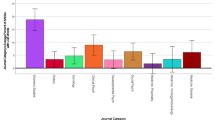Abstract
This study focuses on the relationship between sex role attitude—traditionality and nontraditionality—and perception of psychological abuse. It was hypothesized that nontraditional women would be more adept at perceiving abuse than traditional women. Two hundred and fourteen subjects were polled using the Attitude Toward Women Scale. The 30 most traditional and 30 least traditional women were compared in terms of their reactions to vignettes depicting marital interactions. Several factors were analyzed in an attempt to explain why the nontraditional women were more sensitive in their perception of psychological abuse. Among these factors were educational level, tolerance for conflict, participation in consciousness-raising groups, “psychological sophistication,” and religious background.
Similar content being viewed by others
References
Chodorow, N. The reproduction of mothering: Psychoanalysis and the sociology of gender. Berkeley, CA: University of California Press, 1978.
DeGregoria, B. Traditional compared with nontraditional women's perceptions of psychological abuse. Unpublished doctoral dissertation, Hofstra University, 1982.
Dobash, R., & Dobash, R. Wives: The appropriate victims of marital violence. Victimology, 1977–1978, 2, 426–442.
Ellis, L., & Bentler, P. Traditional sex-determined role standards and sex stereotypes. Journal of Personality and Social Psychology, 1973, 25(1), 28–34.
Festinger, L. A theory of cognitive dissonance. Stanford, CA: Stanford University Press, 1957.
Gilligan, C. In a different voice: Psychological theory and women's development. Cambridge, MA: Harvard University Press, 1982.
Goldschmidt, J., Gergen, M. M., Quigley, K., & Gergen, K. J. The women's liberation movement: Attitudes and action. Journal of Personality, 1974, 42, 601–617.
Hoffman, D. M., & Fidell, L. S. Characteristics of androgynous, undifferentiated, masculine and feminine middle-class women. Sex Roles, 1979, 5(6), 765–781.
Hoffman, P. Psychological abuse of women by spouses and live-in lovers. Women & Therapy, 1984, 3(1), 37–47.
Jones, E. F., & Westoff, C. F. How attitudes toward abortion are changing. Journal of Population, 1978, 1, 5–21.
Kalmuss, D. The attribution of responsibility in a wife-abuse context. Victimology, 1979, 3, 284–291.
Kasper, S. Judgments of professional and nonprofessional men and women about psychological abuse in marriage. Unpublished doctoral dissertation, Hofstra University, 1982.
Mason, K. O., Czajka, J. L., & Arber, S. Change in women's sex role attitudes, 1964–1974. American Sociological Review, 1976, 41(4), 573–596.
McClintock, F. Criminological aspects of family violence. In J. Martin (Ed.), Violence and the Family. New York: John Wiley & Sons, 1978.
Miller, J. Toward a new psychology of women. Boston, MA: Beacon Press, 1976.
Nunnally, J. The communication of mental health information: A comparison of the opinions of experts and the public with mass media presentation. Behavioral Science, 1957, 2, 222–230.
Parsons, T., & Bales, R. Family, socialization and interaction process. New York: Free Press, 1955.
Rounsaville, B. Theories in marital violence: Evidence from a study of battered women. Victimology, 1978, (3), 1–2, 11–31.
Roy, M. A current survey of 150 cases. In M. Roy (Ed.), Battered women. New York: Van Nostrand Reinhold, 1977.
Scanzoni, J., & Fox, G. L. Sex roles, and family and society: The seventies and beyond. Journal of Marriage and the Family, 1980, 42(4), 743–755.
Seligman, M. Helplessness: On depression, development and death. New York: Scribner, 1975.
Spence, J. T., & Helmreich, R. The Attitudes Toward Women Scale: An objective instrument to measure attitudes toward the rights and roles of women in contemporary society. Journal Supplement Abstract Service Catalog of Selected Documents in Psychology, 1972, 2, 197–213.
Spence, J. T., & Helmreich, R. Masculinity and femininity: Their psychological dimensions, correlates and antecedents. Austin, TX: University of Texas Press, 1978.
Star, B. Comparing battered and nonbattered women. Victimology, 1978, 3, 32–44.
Tarr, L. Developmental sex role theory and sex role attitudes in late adolescents. Psychological Reports, 1978, 42, 807–814.
Thornton, A., & Freedman, D. Changes in the sex role attitudes of women, 1962–1977: Evidence from a panel study. American Sociological Review, 1979, 44, 831–842.
Walker, L. The battered women. New York: Harper & Row, 1979.
Walker, L. The battered woman syndrome study. In D. Finkelhor, Gelles, R., Hotaling, G., & Straus, M. (Eds.), The dark side of families. Beverly Hills, CA: Sage Publications, 1983.
Author information
Authors and Affiliations
Rights and permissions
About this article
Cite this article
DeGregoria, B. Sex role attitude and perception of psychological abuse. Sex Roles 16, 227–235 (1987). https://doi.org/10.1007/BF00289951
Issue Date:
DOI: https://doi.org/10.1007/BF00289951




